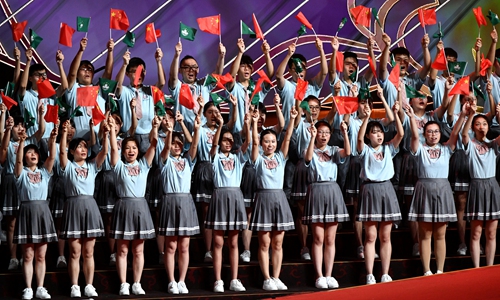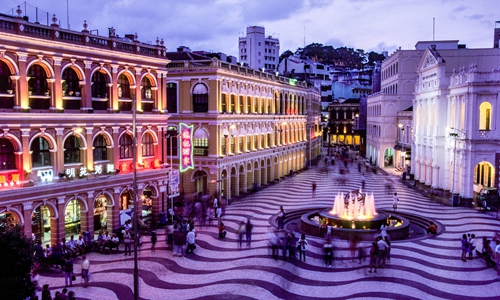Xi extols Macao’s progress
City encouraged to take part in national development plan

Performers wave the China and Macao flags during the Passion of Macao, Heart of China variety show in Macao on Thursday, ahead of the 20th anniversary of the handover from Portugal to China. Photo: AFP
Chinese President Xi Jinping encouraged Macao to give play to its advantages in carrying out "one country, two systems," adopt a firm stance on matters of principle and actively take part in the national development plan.The past 20 years in Macao have seen the fastest economic development and the greatest improvement in people's livelihoods. President Xi attributed this to the implementation of "one country, two systems," a united society pursuing a better life and strong support from the central government and mainland.
On the second day of his Macao trip, Xi visited a school and saw the China-Portuguese-speaking Countries (PSCs) Commercial and Trade Service Platform Complex. He went to a government building complex to learn about livelihood services and met representatives from different social walks.
During his visit to a premier school affiliated to Hou Kong middle school, Xi praised Macao's education system and encouraged that the school would continue conveying Chinese culture.
Patriotic education is very important and the Macao Special Administrative Region government's education authorities and schools should shoulder the main responsibilities, keep up the good work and achieve more on patriotic education, Xi said, according to the Xinhua News Agency.
Xi said it's believed that Macao youth will be a generation to be proud of, as they are growing into pillars of the society.
Chui Sai On, the outgoing Macao Chief Executive, said on Thursday the most valuable experience of Macao's successful practice of "one country, two systems" was the comprehensive and accurate implementation of the Constitution and the Basic Law. Macao has an accurate understanding and true support for the country's political system and core national values.
Observers said Xi fully affirmed the significant progress Macao has made since its return to China, showing that the "one country, two systems" principle has full vitality and conveyed a strong message that Macao could be a reference in aspects such as youth education and livelihood for Hong Kong, which has been struggling with social unrest.
From a Portuguese colony to a world gambling hub, Macao is poised to overtake Qatar with the highest per capita gross domestic product on a purchasing power parity basis by 2020, based on forecast.
With a land area of 32.9 square kilometers, the island has seen its economic growth skyrocket by over 700 percent over the past two decades and become a city with high-quality social welfare.
During a meeting with representatives from different social spheres, Xi noted that although Macao is a small city, it could be rich, vibrant, stable and beautiful, according to media reports. He hoped that people from all circles of society could continue firmly supporting the SAR government and chief executive in rolling out polices in accordance with the law, actively connecting government and citizens and holding a firm position on matters of principle.
Xi's visit to the school and his speech conveyed a clear message that Macao was on the right path and could offer lessons for Hong Kong.
Former officials and experts said that although the two SARs shared some common characteristics such as a high degree of autonomy, judicial independence and press freedom, they have differences in the way they handle relations with the central government and in carrying out the "one country, two systems" principle.
Local observers suggested instead of simply labeling Macao a "good student" as the city has been immune to disruptive anti-government protests spiraling in Hong Kong, it needs an examination from historical, cultural and social perspectives to find the fundamental reasons why the two cities have charted different growth path since their handover.

Nighttime view of Senado Square in Macao Photo: VCG
SAR differencesAs Hong Kong protesters identify themselves as Hongkongers instead of Chinese, Macao people believe rejecting their Chinese nationality is unacceptable, Wu Zhiliang, president of the Macau Foundation, told the Global Times on Tuesday.
"Macao people have a deep understanding of the word 'return,'" Wu said.
It was not about changing the national flag or shifting from governor to chief executive of the Macao government, Wu said.
"It is about integrating into the country's whole governance and strategic development plans."
Opposition groups in Hong Kong consider any move of the central government as intervention that erodes its high degree of autonomy, and they think the central government could not take any gesture. But it is a misunderstanding of the "one country, two systems" principle, and is not accepted by people in Macao, Wu said.
"When Macao comes up with new policies, it always takes the country's development plans into consideration," Wu said.
For instance, when the central government launched an anti-corruption campaign years ago, Macao imposed restrictions on cross-border financing involving Chinese funds, although it had heavily weighed on its pillar gambling industry, representatives said.
Xi also encouraged representatives from different social circles on Thursday to continue playing an active role in the great rejuvenation of the Chinese nation, having the entire motherland in mind while facing the world. Macao should fully give play to its advantages of internationalization and integrate into a broad national development plan.
"Compared to Hong Kong, there is no such mentality of worshiping Western political systems and social values here in Macao, though it has always been under the mixed influence of Eastern and Western cultures, and people treat those two equally," Wu said.
Unlike Hong Kong, which has been heavily influenced by the West, Macao has a stronger attachment to Chinese culture and values due to its "historical genes."
In the colonial period of Macao, Portuguese control had seen its influence over local communities declining, drawing a contrast with the relatively sophisticated way British authorities ruled Hong Kong before handing it over to China, he said.
"There has been no strong cultural penetration of the West in Macao society, which had not been heavily affected by Western social value either," Susana Chou, former president of the Legislative Assembly of Macao, told the Global Times on Tuesday.
"For example, when the Hotel of Lisboa was inaugurated years ago, many people in Macao did not know where 'Lisboa' is. Could you imagine Hong Kong people not knowing where London is?"
While Hong Kong opposition lawmakers turned policy debates into political confrontations, lawmakers in Macao are not against the Constitution, the Basic Law and the Communist Party of China, the former president said, noting that they would come up with different ideas to help formulate better policies.
"It's also inaccurate to say the Legislative Assembly of Macao is the SAR government's affiliate, as we also criticize our government officials a lot. And the assembly often rejects the proposals made by the government," Chou said, noting that the opposition is based on concrete arguments rather than disapproving everything because of its political stance.
Lesson to learn
Considering Macao's historical ties with the mainland, there has been no room for separatism, Wu noted.
"But what has happened in Hong Kong would lead us to reflect on deep-rooted questions in Macao, particularly issues concerning Macao youth," he said.
Behind Hong Kong's chaos lies some deep-seated social problems, as the majority of arrested radical protesters in violation of the rule of law were youngsters.
Although Macao is not facing the same issue, the problems with Hong Kong youth could be seen as a warning sign for the city, observers said.
"We lack a fair and transparent mechanism for Macao young people to climb upward in social rank, and also the number of skilled job positions is limited," Wu said, noting that the local talent policy is still protective.
"If Macao further opens up its market, could local youth become as competitive as talent from outside? And will talent inflow intensify social conflicts and the anxiety of local youth?" he said.
While Hong Kong and Macao both share freedom of speech and an open internet, information has been circulating freely on social media and many Macao young people have been well informed about Hong Kong's months-long social unrest.
When Macao students were asked about whether Hong Kong police have abused their power, many rationally discussed the matter with teachers instead of arguing with their peers and making one-sided judgments, Wu noted.
"Young people could easily influence each other, which is inevitable. It's up to how teachers and parents guide them," he said.
Local education representatives said Xi highlighted the importance of learning Chinese history and understanding China during his visit to the Macao school on Thursday and basic education in Macao has achieved success thanks to the "patriotic genes" of Macao people, which should be passed on to future generations.
"With the support of civil associations, the Macao SAR government has also been playing an active role in enhancing patriotic education, leading to the city's stability and prosperity today, which could become experiences for Hong Kong," Cheang Hong Kuong, president of the administrative board of the Chinese Educators' Association of Macao, told the Global Times.
Macao has gained a higher degree of autonomy thanks to the confidence and trust of the central government, which, observers said, creates a positive cycle.
On the contrary, if Hong Kong's opposition groups continue to touch the "red line" of the central government, it might lead to reevaluation of political risks in Hong Kong by the central government and political reforms could hardly make progress in the city, the observers said.
The virtuous cycle established between the central government and Macao SAR as well as between Macao and the mainland could to some extent serve as a reference for Hong Kong, they noted.

